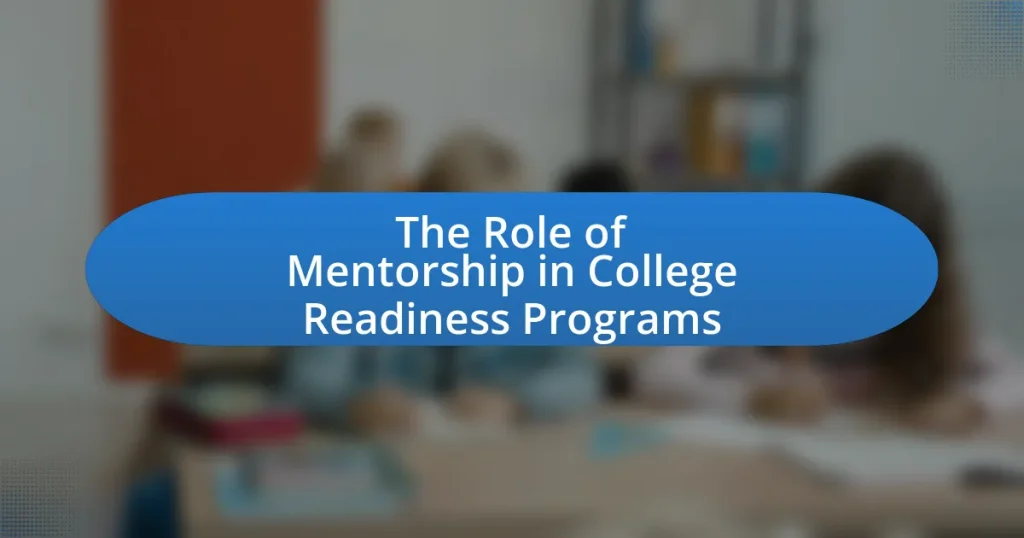The article focuses on the critical role of mentorship in college readiness programs, emphasizing how mentors provide essential guidance, support, and resources to help students prepare for higher education. It highlights research findings that demonstrate mentored students are significantly more likely to enroll in college and achieve academic success. The article explores various mentorship models, including one-on-one, group, peer, and faculty mentoring, and discusses the specific skills and psychological benefits that mentorship fosters. Additionally, it addresses challenges in mentorship, strategies for effective implementation, and best practices to enhance the mentorship experience, ultimately underscoring the importance of structured support systems in promoting student engagement and success in college readiness initiatives.

What is the Role of Mentorship in College Readiness Programs?
Mentorship plays a crucial role in college readiness programs by providing guidance, support, and resources to students as they prepare for higher education. Mentors help students navigate the complexities of college applications, financial aid, and academic expectations, which can significantly enhance their confidence and preparedness. Research indicates that students with mentors are more likely to enroll in college and persist through their studies, as mentorship fosters a sense of belonging and accountability. For instance, a study by the National Mentoring Partnership found that mentored youth are 55% more likely to enroll in college compared to their non-mentored peers. This evidence underscores the importance of mentorship in equipping students with the necessary skills and knowledge for successful college transitions.
How does mentorship influence student success in college readiness programs?
Mentorship significantly enhances student success in college readiness programs by providing personalized guidance and support. Mentors help students navigate academic challenges, develop essential skills, and build confidence, which are critical for college preparedness. Research indicates that students with mentors are more likely to enroll in college and persist through their studies, as evidenced by a study from the National Mentoring Partnership, which found that mentored youth are 55% more likely to enroll in college and 78% more likely to volunteer regularly in their communities. This data underscores the positive impact of mentorship on academic outcomes and overall student success in college readiness initiatives.
What specific skills do mentors help students develop?
Mentors help students develop critical thinking, communication, and problem-solving skills. These skills are essential for academic success and personal growth. Research indicates that mentorship programs significantly enhance students’ abilities to analyze information, articulate their thoughts clearly, and navigate challenges effectively, which are crucial for college readiness. For instance, a study by the National Mentoring Partnership found that mentored students are 55% more likely to enroll in college and 78% more likely to volunteer regularly in their communities, highlighting the impact of mentorship on developing these vital skills.
How does mentorship impact students’ academic performance?
Mentorship positively impacts students’ academic performance by providing guidance, support, and resources that enhance learning outcomes. Research indicates that students with mentors often achieve higher grades, exhibit improved retention rates, and develop better study habits compared to those without mentorship. For instance, a study published in the Journal of Educational Psychology found that students who participated in mentorship programs had a 20% increase in GPA and a 30% higher likelihood of graduating on time. This evidence underscores the significant role mentorship plays in fostering academic success among students.
Why is mentorship important in the context of college readiness?
Mentorship is crucial in the context of college readiness because it provides guidance, support, and resources that enhance students’ academic and personal development. Mentors help students navigate the complexities of college applications, financial aid, and course selection, which can significantly impact their readiness for higher education. Research indicates that students with mentors are more likely to enroll in college and persist through their studies, as they receive personalized advice and encouragement. For instance, a study by the National Mentoring Partnership found that mentored youth are 55% more likely to enroll in college compared to their non-mentored peers, highlighting the positive influence of mentorship on college readiness.
What are the psychological benefits of having a mentor?
Having a mentor provides significant psychological benefits, including increased self-esteem, reduced anxiety, and enhanced emotional support. Mentors offer guidance and encouragement, which can lead to greater confidence in decision-making and personal abilities. Research indicates that individuals with mentors report higher levels of satisfaction and lower levels of stress, as mentors help navigate challenges and provide a sense of belonging. A study published in the Journal of Vocational Behavior found that mentorship positively correlates with psychological well-being, highlighting the importance of supportive relationships in personal development.
How does mentorship address the challenges faced by students in college readiness programs?
Mentorship effectively addresses the challenges faced by students in college readiness programs by providing personalized guidance and support. This relationship helps students navigate academic, social, and emotional hurdles, enhancing their preparedness for college. Research indicates that students with mentors are more likely to develop essential skills such as time management and goal setting, which are critical for success in higher education. Additionally, a study by the National Mentoring Partnership found that mentored students are 55% more likely to enroll in college and 78% more likely to volunteer regularly in their communities, demonstrating the positive impact of mentorship on college readiness.

What types of mentorship models are used in college readiness programs?
College readiness programs utilize several mentorship models, including one-on-one mentoring, group mentoring, peer mentoring, and online mentoring. One-on-one mentoring involves individualized support where a mentor guides a student through the college preparation process, addressing specific needs and goals. Group mentoring allows multiple students to benefit from shared experiences and insights, fostering a collaborative learning environment. Peer mentoring leverages relationships among students, where more experienced peers provide guidance to those less experienced, promoting a sense of community. Online mentoring utilizes digital platforms to connect mentors and mentees, offering flexibility and accessibility. These models have been shown to enhance student engagement and improve college readiness outcomes, as evidenced by studies indicating that mentorship significantly increases students’ academic performance and college enrollment rates.
How do peer mentorship programs function?
Peer mentorship programs function by pairing individuals with similar experiences or backgrounds to provide guidance, support, and encouragement. These programs typically involve a structured framework where mentors, often more experienced peers, help mentees navigate challenges, share resources, and develop skills relevant to their academic and personal growth. Research indicates that peer mentorship can enhance retention rates and improve academic performance, as evidenced by a study published in the Journal of College Student Development, which found that students involved in peer mentoring reported higher levels of engagement and satisfaction in their college experience.
What are the advantages of peer mentorship for students?
Peer mentorship offers several advantages for students, including enhanced academic performance, improved social skills, and increased confidence. Research indicates that students involved in peer mentorship programs often achieve higher grades and better retention rates, as they receive support tailored to their specific needs. Additionally, peer mentors help mentees develop essential interpersonal skills, fostering collaboration and communication. A study by the National Mentoring Partnership found that mentored students are 55% more likely to enroll in college and 78% more likely to volunteer regularly in their communities, demonstrating the long-term benefits of peer mentorship.
How do peer mentors relate to their mentees?
Peer mentors relate to their mentees through shared experiences and supportive guidance. This relationship is characterized by mutual understanding, as peer mentors often have faced similar challenges and can provide relevant advice and encouragement. Research indicates that peer mentoring enhances academic performance and personal development, as seen in studies like “The Impact of Peer Mentoring on College Student Success” by Topping and Ehly, which highlights improved retention rates and increased self-efficacy among mentees.
What role do faculty mentors play in college readiness?
Faculty mentors play a crucial role in college readiness by providing guidance, support, and resources that help students navigate the transition to higher education. They assist students in developing academic skills, understanding college expectations, and creating effective study habits. Research indicates that students with faculty mentors are more likely to persist in their studies and achieve higher academic performance, as mentors offer personalized advice and encouragement tailored to individual needs. For instance, a study published in the Journal of College Student Development found that mentorship positively impacts students’ self-efficacy and academic motivation, which are essential components of college readiness.
How do faculty mentors contribute to academic guidance?
Faculty mentors contribute to academic guidance by providing personalized support, expertise, and resources that enhance students’ educational experiences. They assist students in navigating academic challenges, developing study strategies, and setting achievable goals. Research indicates that students with faculty mentors are more likely to persist in their studies and achieve higher academic performance, as evidenced by a study published in the Journal of College Student Development, which found that mentorship positively impacts student retention rates and academic success.
What is the impact of faculty mentorship on career exploration?
Faculty mentorship significantly enhances career exploration by providing students with personalized guidance and insights into various professional pathways. This mentorship fosters a supportive environment where students can discuss their interests, gain industry knowledge, and develop essential skills. Research indicates that students who engage with faculty mentors are more likely to explore diverse career options, as these mentors often share their own experiences and networks, facilitating connections that can lead to internships and job opportunities. For instance, a study published in the Journal of College Student Development found that students with faculty mentors reported higher levels of career satisfaction and clarity regarding their professional goals, demonstrating the positive impact of mentorship on career exploration.

How can mentorship be effectively implemented in college readiness programs?
Mentorship can be effectively implemented in college readiness programs by establishing structured mentorship relationships that connect students with experienced mentors who provide guidance, support, and resources. These relationships should include regular meetings, goal-setting sessions, and personalized academic and career advice tailored to the individual needs of students. Research indicates that mentorship significantly enhances college readiness; for instance, a study by the National Mentoring Partnership found that mentored students are 55% more likely to enroll in college and 78% more likely to volunteer regularly in their communities. By integrating mentorship into college readiness programs, institutions can foster a supportive environment that encourages student engagement and success.
What strategies can programs use to recruit and train mentors?
Programs can use targeted outreach, comprehensive training, and ongoing support to effectively recruit and train mentors. Targeted outreach involves identifying potential mentors through community networks, professional organizations, and social media platforms, ensuring a diverse pool of candidates. Comprehensive training should include orientation sessions that cover program goals, mentoring techniques, and relationship-building strategies, which can be supported by research indicating that well-trained mentors significantly improve mentee outcomes. Ongoing support, such as regular check-ins and access to resources, helps mentors feel valued and equipped to handle challenges, thereby enhancing their effectiveness.
How can programs ensure mentor-mentee compatibility?
Programs can ensure mentor-mentee compatibility by implementing structured matching processes that assess interests, goals, and personalities of both parties. For instance, utilizing surveys or assessments to gather information about the preferences and expectations of mentors and mentees allows programs to create compatible pairings. Research indicates that effective matching can lead to improved satisfaction and outcomes in mentorship relationships, as seen in studies like “The Impact of Mentoring on College Student Success” published in the Journal of College Student Development, which highlights the importance of alignment in values and objectives for successful mentorship.
What ongoing support do mentors need to be effective?
Mentors need ongoing training, access to resources, and regular feedback to be effective. Continuous training ensures that mentors are updated on best practices and new strategies in mentorship, which enhances their ability to guide mentees effectively. Access to resources, such as educational materials and networking opportunities, allows mentors to provide relevant support tailored to their mentees’ needs. Regular feedback from program coordinators helps mentors assess their performance and make necessary adjustments, fostering a more impactful mentoring relationship. Research indicates that structured support systems significantly improve mentor effectiveness, as seen in studies conducted by the National Mentoring Partnership, which highlight the importance of these elements in successful mentorship programs.
What best practices should be followed for successful mentorship?
Successful mentorship requires establishing clear goals and expectations between the mentor and mentee. This foundational practice ensures both parties understand their roles and objectives, fostering a productive relationship. Research indicates that structured mentorship programs, which include defined goals, lead to higher satisfaction and better outcomes for participants. For instance, a study published in the Journal of Vocational Behavior found that mentees with clear expectations reported a 20% increase in goal achievement compared to those without such clarity. Additionally, regular communication and feedback are essential, as they help to build trust and facilitate growth. A consistent check-in schedule can enhance accountability and support the mentee’s development.
How can programs measure the effectiveness of mentorship?
Programs can measure the effectiveness of mentorship through quantitative and qualitative assessments. Quantitative methods include tracking mentee academic performance, retention rates, and graduation rates, which provide measurable outcomes of mentorship impact. Qualitative assessments involve surveys and interviews with mentees and mentors to gather feedback on personal growth, skill development, and satisfaction with the mentorship experience. Research indicates that programs utilizing both methods can achieve a comprehensive understanding of mentorship effectiveness, as evidenced by a study from the National Mentoring Partnership, which found that 70% of mentees reported improved academic performance due to mentorship.
What resources are available for mentors and mentees?
Mentors and mentees have access to various resources that enhance their relationship and support the mentoring process. These resources include structured mentorship programs, online platforms for communication and collaboration, training materials for skill development, and networking opportunities within educational institutions. For instance, organizations like the National Mentoring Partnership provide guidelines and toolkits that help mentors and mentees establish effective communication and set goals. Additionally, many colleges offer workshops and seminars focused on mentorship skills, which further equip participants with the necessary tools to succeed in their roles.
What are common challenges in mentorship within college readiness programs?
Common challenges in mentorship within college readiness programs include mismatched expectations, lack of resources, and insufficient training for mentors. Mismatched expectations can lead to frustration, as mentors and mentees may have different goals or levels of commitment. A study by the National Mentoring Partnership highlights that 50% of mentoring relationships fail due to unclear expectations. Additionally, lack of resources, such as time and funding, can hinder the effectiveness of mentorship programs, making it difficult for mentors to provide adequate support. Furthermore, insufficient training for mentors can result in a lack of confidence and skills necessary to guide mentees effectively, as noted in research by the Mentoring Effect report, which states that well-trained mentors are 50% more likely to have a positive impact on their mentees.
How can programs address mentor burnout?
Programs can address mentor burnout by implementing structured support systems, including regular check-ins, professional development opportunities, and peer support networks. These measures help mentors manage their workload and emotional stress, which are significant contributors to burnout. Research indicates that mentorship programs with strong support structures report lower burnout rates among mentors, as they feel more connected and valued within the program. For instance, a study by the National Mentoring Partnership found that mentors who received ongoing training and support were 50% less likely to experience burnout compared to those without such resources.
What strategies can be employed to maintain mentor engagement?
To maintain mentor engagement, regular communication and structured check-ins are essential. Establishing a consistent schedule for meetings, whether weekly or bi-weekly, fosters accountability and keeps both mentors and mentees aligned on goals. Research indicates that programs with structured interactions report higher satisfaction rates among mentors, as seen in the study by Eby et al. (2013) published in the Journal of Vocational Behavior, which highlights the importance of ongoing dialogue in mentorship relationships. Additionally, providing mentors with training and resources enhances their ability to support mentees effectively, further solidifying their commitment to the mentoring process.
What practical tips can enhance the mentorship experience in college readiness programs?
To enhance the mentorship experience in college readiness programs, establishing clear communication channels is essential. Effective communication fosters trust and understanding between mentors and mentees, allowing for open discussions about goals, challenges, and progress. Research indicates that programs with structured communication frameworks report higher satisfaction rates among participants. Additionally, setting specific, measurable goals for the mentorship relationship can provide direction and motivation, as evidenced by studies showing that goal-oriented mentoring leads to improved academic outcomes. Regular feedback sessions can further strengthen the relationship, enabling mentors to adjust their approaches based on mentee needs.


